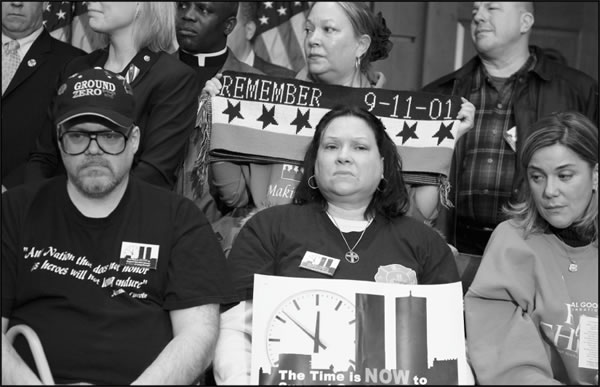BY John Bayles and Aline Reynolds
Another busload of Lower Manhattan community members and 9/11 first responders traveled to Washington D.C. on Tuesday with high hopes pertaining to the Zadroga 9/11 Health bill. Their plan was to instigate a final push in support of the bill and see it return to the Senate floor for a vote.
U. S. Senator Kirsten Gillibrand, one of the bill’s main sponsors, sent out press releases on Sunday and Monday calling for a “Christmas miracle,” stating that she and fellow Senator Charles Schumer believed they had enough bi-partisan support for the bill to finally pass. Then on Tuesday, Republican Senator Tom Coburn from Oklahoma assumed the role of the “Grinch” in the aforementioned “Christmas miracle” scenario.
Early Tuesday morning, Coburn said he would keep the Senate in session through the holiday in order to drag out the debate and block the bill. Coburn argued on Fox News that Zadroga is a bill “that’s been drawn up and forced through Congress at the end of the year on a basis to solve a problem that we didn’t have time to solve and we didn’t get done.”
At a press conference on Tuesday, John Feal, founder of the Fealgood Foundation and one of the bill’s major advocates, questioned Coburn’s intentions.
“Where’s his heart?” asked Feal. “These men and women behind me have gone eight Christmases suffering without any help from the federal government, so I question his heart.”
But regardless of Coburn’s intentions, the bill’s supporters remain optimistic. Late Tuesday, Gillibrand said she was hopeful that the vote to reconsider the legislation could happen as soon as that night or, more likely, on Wednesday.
In an effort to garner G.O.P. support, Gillibrand and Schumer reduced the bill’s price tag from $7.4 billion to $6.2 billion. The bill’s advocates have been trying to secure its passage before January 5, when the makeup of Congress will shift and Republicans will assume the majority in the House.
Gillibrand and Schumer also devised a new way to fund the bill. Rather than relying on the House-approved revenue offsets, the Senate’s bill would largely be financed by a two percent excise fee on select foreign companies that sell goods and services to the U.S. government. In addition to subsidizing the bill, the fee would raise roughly $4.5 billion over the next decade, and create both long- and short-term savings for the U.S., according to Gillibrand’s office.
“In the short term, savings will materialize from competitive foreign contracts… foreign countries will be incentivized to sign [the procurement contract] and the U.S. will be incentivized to look to domestic sources to fill procurement needs,” Gillibrand said in a statement. She also noted that the new package does not tax American citizens or businesses. The new method of funding, she said, is expected to reduce the national deficit by $57 million over the next decade.
A “Travel Promotion Fee,” a fee on foreign travelers journeying to the U.S., would also help finance the revised bill. The fee would be extended from 2015 to 2021, and would supply $1 billion to 9/11 health services over the next decade, according to Gillibrand.
The amendments to the law, Gillibrand said, would likely suffice to gain enough Republican support to avoid a filibuster. “I believe we now have more than enough votes to pass this legislation,” Gillibrand said in a statement on Sunday, saying she worked “extremely closely” with several Republicans to amend the bill. Once it reaches the Senate floor for a traditional “up or down” vote, the bill would require 60 votes to pass.
It would then have to return to the House, which would have to vote again on the amended legislation. Gillibrand and Schumer said they were optimistic the House would be called back into session before January 4 if the bill gets through the Senate.
Tuesday’s drama in Washington followed a press conference held by Mayor Bloomberg at City Hall on Monday. Bloomberg congratulated Gillibrand and Schumer for brokering changes to the bill, and said he would do whatever he can to secure its passage this week.
“The Senate has a full week ahead of it, and it should not adjourn until it passes this bill,” he said. Joining him were New York Representatives Jerrold Nadler, Carolyn Maloney and Peter King, along with Joseph Zadroga, James Zadroga’s father.
Responding to Republican opposition, Bloomberg said, “Caring for the men and women who rushed to our defense on that dark day, and in the days that followed, is nothing less than a national duty. America is too great a country to shirk this duty. We are too strong. Too proud. Too patriotic. And this is the week that we have to show it.”


































